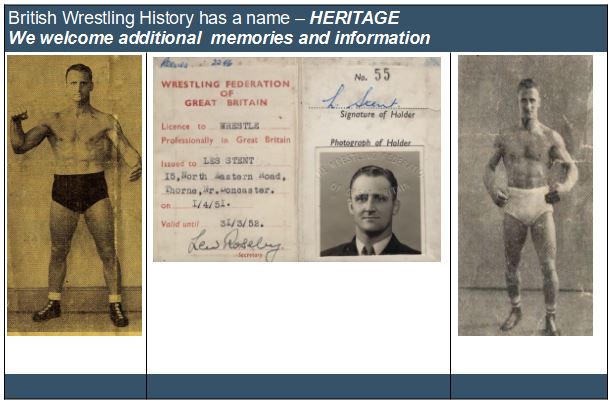Also known as Ronnie Wilde
Wrestling Heritage welcomes memories, further information and corrections.

Les Stent wasn’t just a gentleman.
Friends and family knew him as a gentle man. Until he stepped into the wrestling ring that is. Les Stent was one of the toughest of men to set foot in the ring with a punishing, aggressive nature that failed to disguise the wrestling skills of a master technician.
Les was born in Newport, Wales, on 20th August 1913. In the 1930s he moved to Thorne, a small town near Doncaster in South Yorkshire, pursuing work in the collieries of South Yorkshire.
Wrestling was booming in Britain with tournaments promoted regularly in most towns around the country. Times were hard and many young men of the time saw wrestling as a means of escaping the drudgery of life in the industrial north.
Near neighbours of Les were Harold Angus and Jack Pye, both setting out on wrestling careers. Harold had also recently moved to Yorkshire, in his case from Wigan in Lancashire. Harold and Les became good friends and Harold, a former Olympian, perfected Les’s natural wrestling ability and taught him the necessary skills to turn professional.
Les was certainly wrestling professionally as early as 1933, when he was twenty years old. Sometimes the name on the posters was Ronnie Wilde, a pseudonym adopted by Les for the first few years.
Within a short time Les was in great demand around the country, wrestling as far south as Plymouth and north to Edinburgh. Early opponents included Vic Coleman, Guido Ronga and, of course, Harold Angus.
Clouds were gathering on the horizon and although the outbreak of World War Two didn’t curtail Les’s career it naturally slowed it’s progress down somewhat. At the time he listed his occupation as “Dairy Worker.”
A shortage of wrestlers resulted in the cancellation of wrestling in many towns for the duration of the war, though the continuation of tournaments in larger halls such as Belle Vue, Manchester, and the St James Hall, Newcastle, played an important part in creating a sense of normality in wartime Britain. Naturally Les was called up and served as a Staff Sergeant in the A.P.T.C., wrestling whenever the opportunity arose, billed still as Ronnnie Wilde and sometimes Sergeant Wilde.
Following the cessation of hostilities BBC television resumed in June 1946, broadcasting a few hours each week to those living around London and rich enough to own a television set.
The BBC broadcast a series of wrestling matches, one of which was, on 26th August, Les Stent against Bradford’s Joe Hill. Les could, therefore, rightly claim to be one of the first wrestlers to appear on television.
From 1946 onwards Les, now using his birth name, was one of the busiest workers in the business, travelling up and down the country day after day.
His opponents were always top class opposition, with Les taking the decision over George Kidd, Jack Dempsey, Carlton Smith, Alan Colbeck and Tommy Mann.
On 11th January, 1949 Les faced British middleweight champion Jack Dale in a non-championship contest at Chelmsford. It was a thrilling contest reported in the press as “The talk of town.”
Consequently a championship contest was arranged with longstanding champion Dale narrowly holding on to his belt in front of a capacity crowd on 30th March 1949. Shortly afterwards championship success did come his way with stints as British welterweight and eventually middleweight champion. Welterweight honours came prior to the formation of Joint Promotions, and were in addition to Les’s recognition as Welsh champion at welterweight and middleweight. There was, however, disappointment for Les when he reached the final of a tournament at Earls Court, London, to determine the inaugural Joint Promotions British welterweight champion in 1952, losing to Alan Colbeck, a man he had defeated on other occasions. In 1954 Les did finally grasp the Lord Mountevans British middleweight championship, and held onto the belt until Guido Ronga grabbed it some two years later.
At his home in Thorne Les set up a gymnasium for his own training purposes. Very quickly other wrestlers were joining Les and the gymnasium became a breeding ground for youngsters, one of the most notable of Les’s proteges being Albert Wall, another miner destined to become British Heavyweight champion.
By the mid 1950s, with a career of more than twenty years, Les wrestled less frequently, though he remained involved in the wrestling business as the promoter at Doncaster Corn Exchange.
Following a life in the mines and the wrestling ring Les became a steward at a working men’s club, and latterly a brewery representative for Allied Breweries.
Les Stent died at Louth Hospital, Lincolnshire, on 6th September 1981. He and his wife had three sons, Ralf, Graham and Brian.
Page reviewed 13/08/2021
2010
